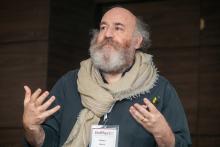The history of physics teaches us that striking phenomena often have deep theoretical explanations. Some of these phenomena are accessible only in sophisticated laboratories, but some are things we see (literally) everyday, such as the fact that the sky gets dark at night. Among the most striking of everyday phenomena is the emergence of life from inanimate matter. We we look closely, a number of features of the living world hold a special fascination for physicists. On a dark night, our eyes can count individual quanta of light. When we point to the source of a sound, we are measuring time differences of just a few millionths of a second. Even though each bird in a flock sees only a few neighbors, thousands of them can agree on a single direction and speed at which to fly. In a developing embryo, cells squeeze as much information as possible out of a limited number of molecules. I’ll try to explain how we know these things, which has involved a quiet revolution in our ability to do physics experiments on living systems, in all their complexity. Then I’ll use the examples of flocks and embryos to show how these remarkable observations point toward deeper and perhaps more general theories, in the physics tradition.
Bio:
William (Bill) Bialek is the John Archibald Wheeler/Battelle Professor in Physics, and a member of the multidisciplinary Lewis-Sigler Institute, at Princeton University. He would like to know if there are theoretical principles that have the power and generality that we have come to expect in physics, yet encompass the complexity and diversity of life’s most beautiful phenomena. This search has led him to a wide range of problems, from the quantum dynamics of single molecules to collective behavior in the neural networks of the brain, and more.
Educated in the San Francisco public schools, Bialek received his bachelor’s and doctoral degrees from the University of California, Berkeley. He was on the faculty at Berkeley, and on the staff of the NEC Research Institute, before moving to Princeton. He has enjoyed visiting positions at institutions around the world, including a decade at The Graduate Center of the City University of New York, where helped to launch an Initiative for the Theoretical Sciences.
A member of the US National Academy of Sciences, Bialek has received the Swartz Prize for Theoretical and Computational Neuroscience from the Society for Neuroscience and the Max Delbrück Prize in Biological Physics from the American Physical Society, among other honors. As passionate about teaching as about research, he has received the President’s Award for Distinguished Teaching at Princeton, and served as a Phi Beta Kappa visiting scholar.
